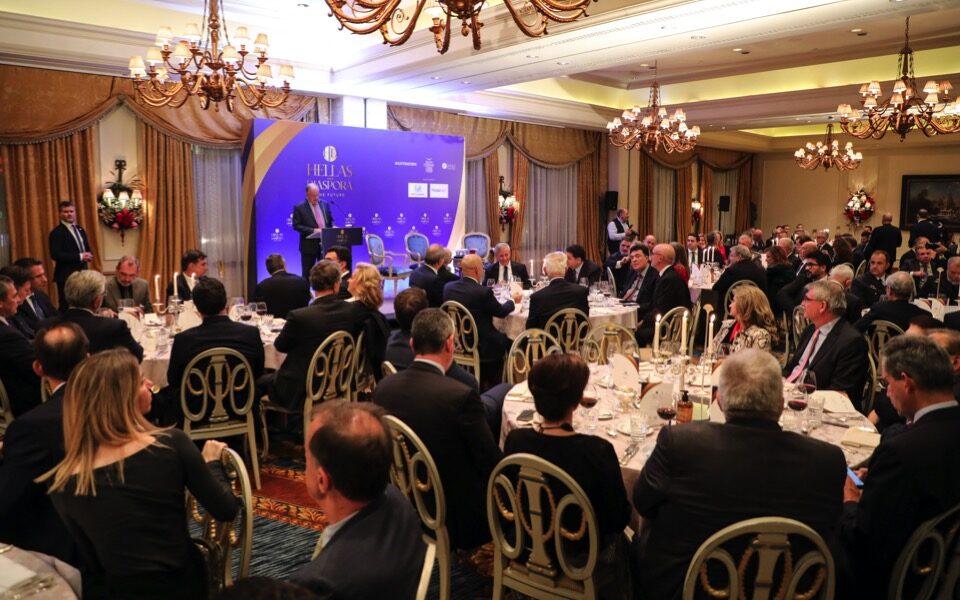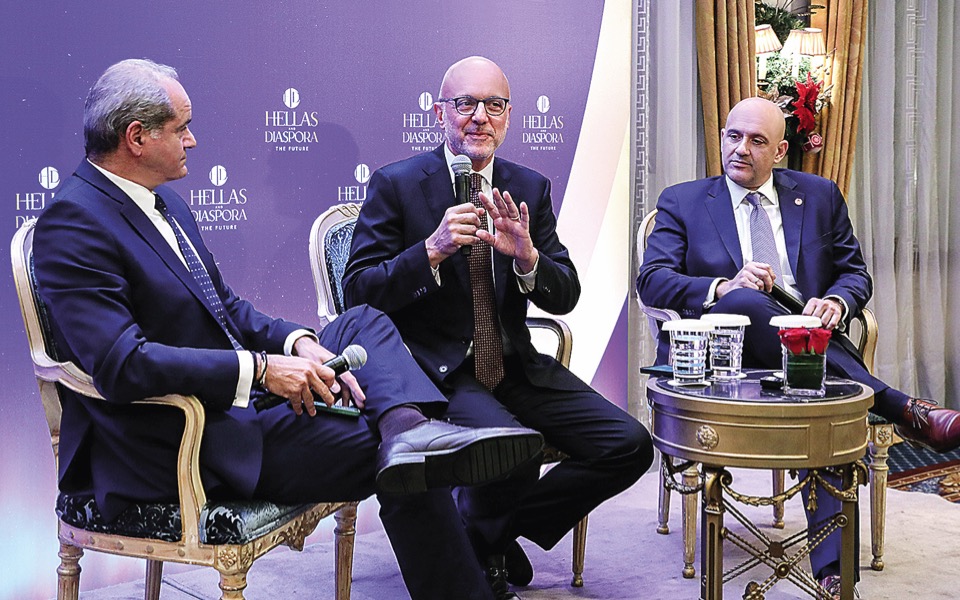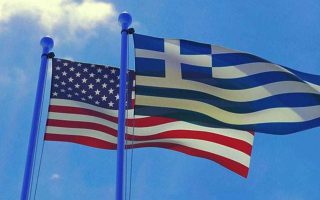Activating Greece’s diaspora, one step at a time
Kathimerini, Delphi Economic Forum and Hellenic American Leadership Council join forces to reinvigorate expatriate communities and alliances

The first step in a big, concerted effort to bolster the role of the Greek diaspora and make it more effective and useful in policymaking, was taken on Thursday night in Athens with an event held in honor of the head of the American Jewish Committee, Ted Deutch.
The dinner, titled “Hellas and Diaspora: The Future,” was organized by Kathimerini, the Hellenic American Leadership Council (HALC) and the Delphi Economic Forum.
“The relationship between Greece and its diaspora has to do with its very existence,” the speaker of the Hellenic Parliament, Konstantinos Tasoulas, told the event, underscoring the fact that safeguarding and activating the Greek diaspora is enshrined in the country’s constitution.
“Even before our Constitution, before we became a free state, the Greeks abroad, the diaspora, played a decisive role. In the early period of the new Hellenic diaspora, especially during the Ottoman occupation, the role of the Greek communities abroad in crucial national issues was very important and sometimes even prominent. This tradition continued even after the creation of the Greek state and is underlined in the support – material and moral support, individual and collective support – that expatriates were quick to offer to the Greek homeland in almost all circumstances critical to their nation,” he said.
However, “this doesn’t mean that in view of the present-day challenges, this relationship, especially with the Greeks in the United States, cannot be better organized,” added Tasoulas, stressing the challenges in the Eastern Mediterranean and the recent spike in Turkish aggression.
“The Greek diaspora, as we all know, has historically demonstrated for 200 years or more high levels of homeland orientation and has had an instrumental and pivotal input in Greece’s evolution in its political, economic, social and cultural existence,” said the founder and president of the Delphi Economic Forum, Symeon Tsomokos, in the opening address.
Kathimerini’s executive editor and one of the driving forces behind the initiative, Alexis Papachelas, described the diaspora as an “underutilized asset.”
“Anyone who reads Kathimerini in Greek or English knows that we are almost obsessed with the role of the diaspora in our times. We consider it a tremendous but underutilized asset of soft, even hard power,” he said.
“We thought that we should pick a success story to be told, discussed and celebrated at this first event. And what better case than the partnership between the Greek-American and the Jewish-American organizations that have come to fruition in the past few years?
“We thought that the dream guest for our first event would be congressman Ted Deutsch. He has been at the forefront of supporting Greece in Congress and has played a crucial role in the alliance between Greek- and Jewish-American communities,” said Papachelas of the guest of honor.
“We want to learn from the community that has become the true gold standard in terms of political influence. We want to learn from its experience in building really strong ties with Israel. We can learn from our natural allies and friends how to reinvigorate global Hellenism because after all this nation truly flourished over the centuries only when its diaspora flourished and kept close ties with the homeland. We need to move forward and fast on this front,” he added.
The discussion that followed between Kathimerini English Edition Editor in Chief Tom Ellis, who noted that he himself feels part of the diaspora and looks forward to a closer coordination between all parts of Hellenism, Deutch and the executive director of HALC, Endy Zemenides, addressed the priorities and prospects of cooperation between Greek and Jewish organizations in the United States.
As Deutch noted, one of the greatest achievements of that cooperation has been elevating the role of the Eastern Mediterranean as a single entity on the international stage with the Greece-Israel-Cyprus partnership, or the 3+1, with the support of the United States.
“This is not only about the relationship between the United States and Greece, or between Greece and Israel. It’s ultimately about the relationship between the Hellenic community and the Jewish community,” said Deutch.
“Neither community is particularly large, we don’t dominate the political scene in Washington. And when you take those two and you add, for obvious reasons, the country of Cyprus, suddenly you have three countries that their communities care so much about, and it adds heft to their ability politically and it brings the communities closer together,” said Deutch, a former Florida lawmaker who is also one of the key figures behind the United States-Greece Defense and Interparliamentary Partnership Act of 2021.
“The Congressional Hellenic Israel alliance is the first time members of Congress have ever come together to advocate for a group of countries. It’s very meaningful, it’s very important and… efforts to work together to focus on the region have made the Eastern Mediterranean a region in Washington now. The Eastern Mediterranean now has a prominent place in the world and that is a place led by Greece. And that is a difference that has not existed before. It shifts the way the world thinks about the region,” he said.
Asked about Ankara’s recent overtures to Israel and other regional players, Deutch said that “there is clearly a ceiling to where the relationship can go unless there’s a willingness on the part of Turkey to make some rather dramatic changes.” He particularly mentioned Turkey’s continued occupation of Cyprus and its violations of the United Nations Convention on the Law of the Sea. “But it doesn’t mean there shouldn’t be talks,” he added. Zemenides, for his part, stressed that the relationship between the two communities in the United States runs much deeper than what meets the eye and this is evident in the joint interventions with regards to American policy. He pointed to consistent contacts and day-to-day communication over the issues of mutual interest.
Coming up
Kathimerini, the Hellenic American Leadership Council and the Delphi Economic Forum plan to run more events and activities on the future of the Hellenic diaspora.
“The aim of these events is to bring together government officials, as well as representatives of academia, diaspora organizations, civil society and leaders from the private sector to discuss how homeland and diaspora can both develop a closer and collaborative vision in the years to come, to the benefit of all,” said Symeon Tsomokos.
“The effort will continue in February 6-7 of next year, in Washington, during the fourth East-Med and South-East Europe Conference, which is jointly organized by the three organizations and during which we will honor a leading personality of the Hellenic diaspora in the United States – Angelo Tsakopoulos – for his contribution to the Hellenic idea and cause,” he added.






